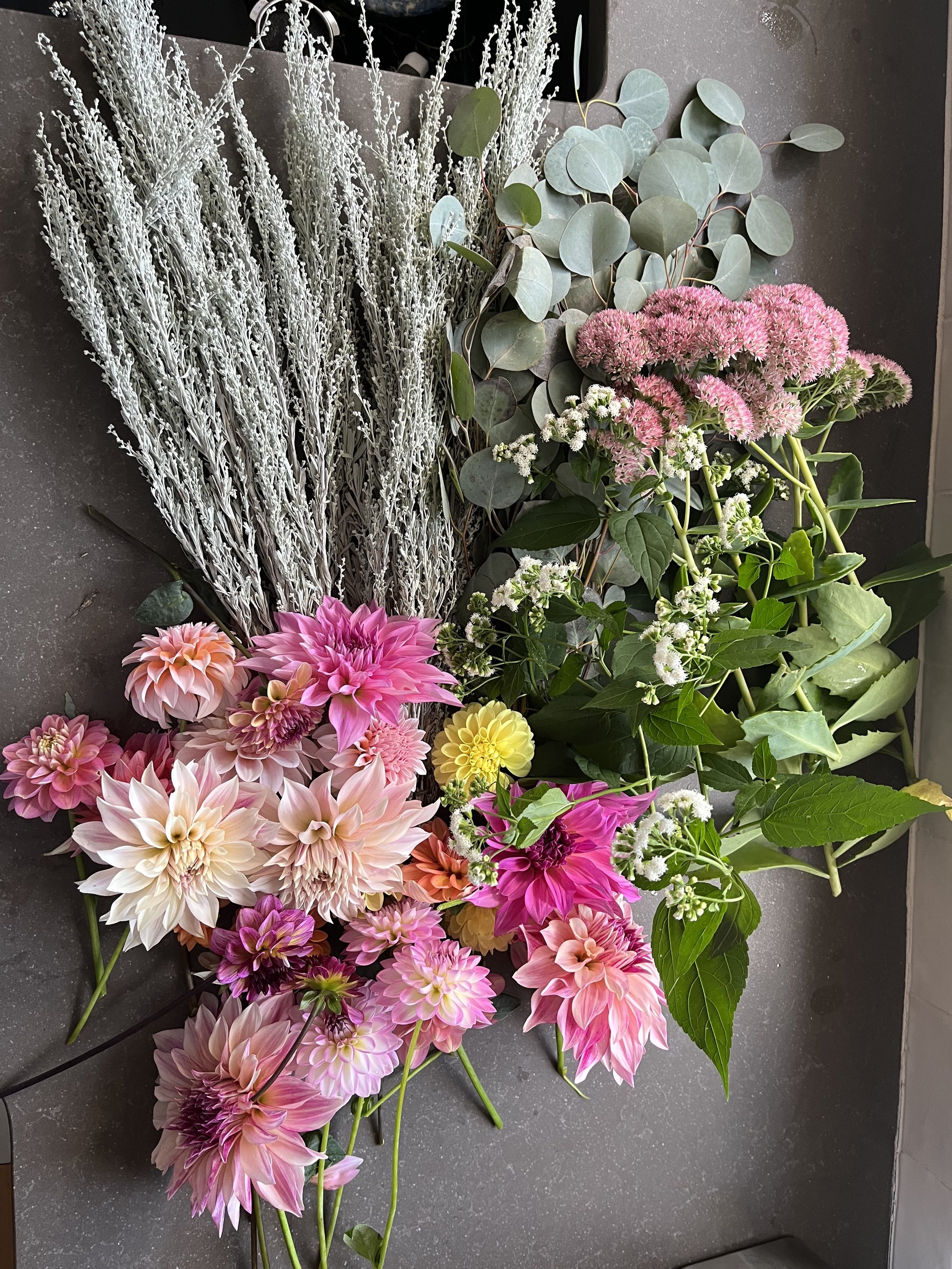On Flowers, and Filler, and Making Life Meaningful
/My son got married last weekend. My daughters and I kicked off the wedding weekend with a trip to Trader Joe’s to fill a cart with flowers. Katie, who is almost 20, said that filling a cart with cut flowers is a bucket list item for her. They were all giddy with the errand, to be honest. From there, we went to the rehearsal dinner venue to decorate. Sarah folded gingham napkins and tucked handwritten place cards and favors inside. Katie and I created 25 Mason jar bouquets. My 8-year-old granddaughter, Lucy, asked to help. So, as we worked, Katie offered the fine points of flower arranging.
First, she told her niece, you need a focal flower — something big to anchor the whole thing. Then, some medium sized blooms will provide color and interest and set the shape of the bouquet. Finally, fill in with the light and airy stems of green or dainty flowers. Those can move a bit and remind people that the flowers are real and alive.
Lucy caught on quickly, and she made some lovely arrangements of her own. As we worked, and I took in the enormity of the weekend, I pondered Katie’s instructions. I’ve often heard the analogy that life is like a jar of rocks. You put the big stones in first. Then, you add smaller stones and pebbles. Then, you can pour sand in the crevices. The idea is that if you make sure that the important things in life take priority, you will have the time and space for the smaller, less important things. But the flower tutorial hit this mother of the groom a bit differently.
As we raise our children, we hope that we are focusing on the big things, that the focal flowers are fresh and sturdy and able to stay lovely for the life of the arrangement. We want them to know faith comes first, and then family a close second. We tuck in pops of color that are a thoughtful and well-rounded education. And then, there are the other things — the filler. Soccer came to mind immediately in this child’s case. He’s the boy I always share with a laugh when I hear people say disparagingly, “Why do parents spend so much time and energy on youth sports? It’s not like they’re going to get scholarships to college or play on the National Team.”
Well, actually… This kid played on the U-17 US National Team before he went to the University of Virginia, and managed to squeeze out both bachelor and master degrees on his four-year scholarship. This boy’s filler pieces — the baby’s breath and gomphrena and statice — were hearty and long-lasting and they gave definition to his childhood, despite being “just the filler.” The whole expression of the bouquet changes when the filler changes.
Be careful as you choose your filler this fall. As you ponder opportunities for your kids outside the classroom, be mindful of the ways that the filler will demand something of you — your money, your attention, space on your calendar. If you say “yes,” to something, let it be an enthusiastic yes. Don’t say yes at all if you’re going to grumble and complain about what it requires of you. At the same time, don’t be afraid to tinker with the composition of your bouquet. That anchor flower stays the same. But you can play with the others. No school decision is set in stone. And certainly, no extracurricular decision is irrevocable. The beautiful thing about floral arrangements is that no one is exactly like another, and every one can be extraordinarily lovely. Let’s let this autumn be filled with utterly lovely, well-composed bouquets.
Beautycounter right now
As I revive my blog and make this newsletter a regular occurrence, I have had some decisions to make. Instagram keeps changing its algorithm. Every time it twists in the wind, I am reminded of how I don’t want to be held captive to its capriciousness. I also don’t want a blog that is full of pop-ups and blinking ads and recipes that require you to read my life story before you know how much meat to defrost.
So, the plan is for my Beautycounter business to be the sole sponsor here. I ask you to consider that writing is a livelihood and it’s a ministry. It takes some money to create content. I can do this here if you treat yourself to some pretty great lip balm and a new way to take care of your face. Please be patient with these thoughtful “ads” for a self-care line that truly brings beauty to life. If you’re new to Beautycounter, please use the code CLEANFORALL30 on your first order for 30% off. It’s only good through the end of September. And if you already know how great the products are, there's super quick sale happening now. Almost everything is between 15% and 25% off until Saturday. It’s a great time to stock up. I’m so grateful for your support as I write and create and encourage.





















